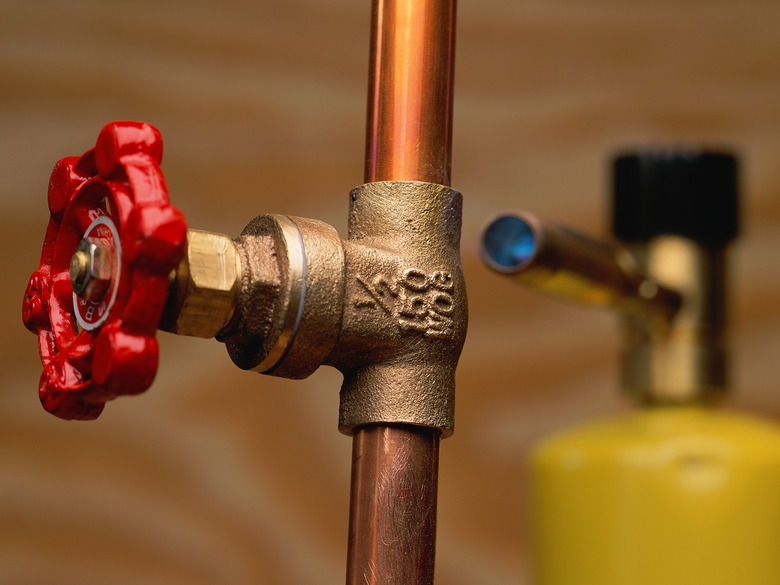Can Softened Water Cause A Copper Pipe To Corrode?
Copper piping has been used to plumb houses and homes for more than 50 years. Builders use it since it is low-cost, and is easy to source. Unfortunately copper piping can be prone to corrosion which can lead to pinhole leaks and contaminated water. The extent to which this occurs has been associated with the specific water chemistry of an area.
Chemistry of Hard and Soft Water
Chemistry of Hard and Soft Water
Scientists classify water based upon the concentration of dissolved minerals. Technically, hard water is defined as having a high concentration of multivalent positive ions. These ions such as Ca2+ and Mg2+ are normally collected by water, as it flows through the ground. Soft water has a lower concentration of calcium and magnesium ions.
Types of Copper Pitting Corrosion
Types of Copper Pitting Corrosion
Copper pitting is a localized type of corrosion that leads to the thinning of the pipe wall in the area. Copper pitting comes in several types that depend on the temperature and pH of water flowing through the pipe. Type 1 pitting occurs when cold water with a high sulfate to chloride ratio flows through the pipe. Type 2 pitting occurs when hot water with pH below 7.2 flows through the pipe. Type 3 pitting occurs when soft water with pH below 8.0 flows through the pipe.
Type 3 Copper Pitting
Type 3 Copper Pitting
Numerous studies have associated soft water with type 3 copper pitting. Although corrosion of the pipe takes place, type 3 copper pitting is not normally associated with the production of pin-holes, resulting in a leak. Instead, it is associated with the generation of corrosive products such as copper sulphate. This type of corrosion can be readily identified by examining the cross-section of the pipe. Copper sulphate deposits, which have a bright blue color, will be found on the inner side of pipes where type three pitting has taken place. Some of these deposits may come loose, and flow in the water. This results in blue-colored water.
Prevention of Corrosion
Prevention of Corrosion
Water supply companies are aware of corrosion problems within specific areas. Scientists have studied the effect of various chemicals in reducing corrosion in copper pipes. One of the most effective is the addition of orthophosphate to water in water plants. Orthophoshate leads to the production of low solubility lead-phosphate layers on the inner surfaces of pipes. This layer protects the pipe against corrosion and simultaneously reduces the amount of lead within the water. In 2003, Dr Marc Edwards from the Washington Suburban Sanitary Commission, recommended the addition of orthophospate to Washington, D.C., drinking water in order to prevent corrosion. The result was a massive reduction in corrosion leaks, from 5,200 in 2003 to 6 in 2010.
References
- BSEE: Avoiding Corrosion
- United States Environmental Protection Agency: Problems with Pinhole Leaks in Your Copper Water Pipes
- United States Environmental Protection Agency: Copper Pitting Corrosion and Pinhole Leaks: A Case Study
- Foundation for Water Research: Causes of Copper Corrosion in Plumbing systems
- Washington Suburban Sanitary Commission: Frequently Asked Questions About Copper Pitting Corrosion
- Diffen: Hard Water vs Soft Water
- Corrosion Doctors: Water Treatment for Corrosion Control
Cite This Article
MLA
Markings, Samuel. "Can Softened Water Cause A Copper Pipe To Corrode?" sciencing.com, https://www.sciencing.com/can-softened-water-cause-copper-pipe-corrode-12310363/. 24 April 2017.
APA
Markings, Samuel. (2017, April 24). Can Softened Water Cause A Copper Pipe To Corrode?. sciencing.com. Retrieved from https://www.sciencing.com/can-softened-water-cause-copper-pipe-corrode-12310363/
Chicago
Markings, Samuel. Can Softened Water Cause A Copper Pipe To Corrode? last modified March 24, 2022. https://www.sciencing.com/can-softened-water-cause-copper-pipe-corrode-12310363/
